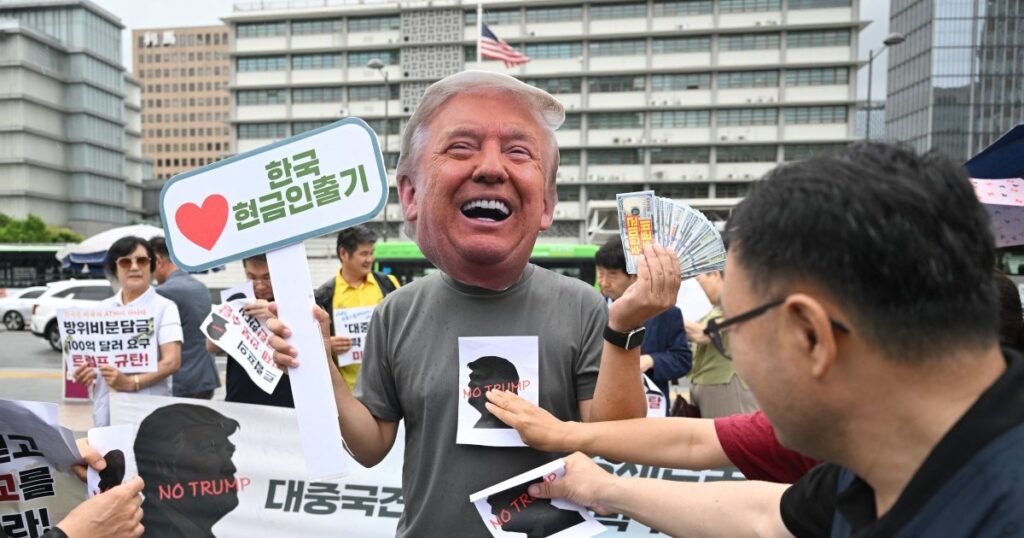
South Koreans’ perceptions of the United States have soured as President Donald Trump’s “America First” foreign policy and trade agenda increasingly strain bilateral relations. The proposed 25 percent tariff on South Korean goods, set to take effect on August 1, has left many feeling betrayed by a long-time ally.
In Seoul, Sideny Sim, a 38-year-old engineer, recalls his previous admiration for the U.S. as a cultural and economic leader. Now, he views the country as a potential threat to geopolitical stability. “If they used to be a country that was known to be a leader in culture, the economy, and the perception of being ‘good,’ I feel like the U.S. is now a threat to geopolitical balance,” Sim told Al Jazeera.
Strained Ties Amid “America First” Agenda
The U.S. and South Korea have long shared deep ties, with South Korea hosting approximately 28,000 U.S. troops as a deterrent against North Korea. The U.S. is also home to the largest South Korean diaspora. However, Trump’s renewed “America First” agenda is testing this alliance. According to a Pew Research Center survey, favorable views of the U.S. in South Korea have dropped from 77 percent in 2024 to 61 percent.
South Korea, a major exporter of electronics, ships, and cars, faces economic disruption if a trade deal is not reached by the August deadline. The country generates over 40 percent of its GDP from exports, making the potential tariffs a significant threat.
Economic Implications and Public Sentiment
Trump’s comments about South Korea’s financial contributions to the U.S. Forces Korea (USFK) have fueled speculation about increased defense spending demands. This has further stirred resentment among South Koreans, like Kim Hyunju, a customer service agent in Seoul. “It would only be fair if they are OK with us raising our tariffs to the same level as well,” Kim said, expressing her growing animosity towards the U.S.
Kim Chang-chul, an investment strategist, offers a more measured perspective, acknowledging the burden of U.S. tariffs while recognizing the strategic depth of U.S. decision-making. “Trump wants South Korea to be more involved in the U.S.’s energy ambitions in Alaska,” he noted, highlighting the geopolitical and economic rebalancing efforts.
“As allies like South Korea share supply chains with the U.S. and work closely with its companies, disregarding these structures and imposing high taxes will likely create burdens on U.S. businesses and consumers as well.” – Keum Hye-yoon, Korea Institute for International Economic Policy
Historical Context and Future Prospects
South Korea’s export sector is already feeling the impact of the looming tariffs. Preliminary data from the Korea Customs Service indicates a 2.2 percent drop in exports for the first 20 days of July compared to the previous year. Sectors such as automotive, steel, semiconductor, and pharmaceuticals have been particularly affected, leading to production declines and workforce reductions.
Historically, U.S.-South Korea relations have weathered difficult periods, such as the 2002 incident involving the death of two South Korean schoolgirls and the 2008 protests over U.S. beef imports. More recently, President Lee Jae-Myung has emphasized maintaining positive relations with China, complicating the dynamics with Washington.
The evolving U.S.-South Korea relationship reflects a shift towards a “conditional alliance” where economic interests often take precedence. Keum Hye-yoon suggests that South Korea explore alternative markets and diversify its exports to mitigate the fallout from Trump’s agenda. “South Korea also doesn’t need to act alone. The country can seek joint action with countries such as EU members, Japan, and Canada to come up with joint responses to the current predicament,” she advised.
As the August deadline approaches, the future of U.S.-South Korea trade relations remains uncertain. The outcome will not only affect economic ties but could also reshape geopolitical alliances in the region.







